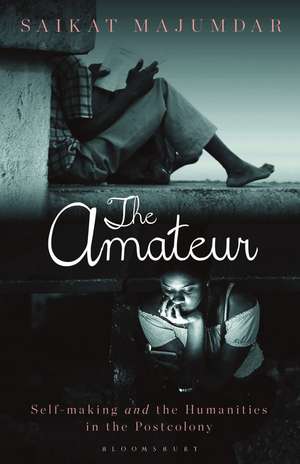The Amateur: Self-Making and the Humanities in the Postcolony
Autor Professor Saikat Majumdaren Limba Engleză Paperback – 10 iul 2024
| Toate formatele și edițiile | Preț | Express |
|---|---|---|
| Paperback (1) | 118.56 lei 3-5 săpt. | +19.04 lei 7-13 zile |
| Bloomsbury Publishing – 10 iul 2024 | 118.56 lei 3-5 săpt. | +19.04 lei 7-13 zile |
| Hardback (1) | 375.31 lei 6-8 săpt. | |
| Bloomsbury Publishing – 10 iul 2024 | 375.31 lei 6-8 săpt. |
Preț: 118.56 lei
Preț vechi: 129.38 lei
-8% Nou
Puncte Express: 178
Preț estimativ în valută:
22.69€ • 23.40$ • 18.93£
22.69€ • 23.40$ • 18.93£
Carte disponibilă
Livrare economică 05-19 martie
Livrare express 19-25 februarie pentru 29.03 lei
Preluare comenzi: 021 569.72.76
Specificații
ISBN-13: 9781501399879
ISBN-10: 150139987X
Pagini: 256
Dimensiuni: 140 x 216 x 25 mm
Greutate: 0.2 kg
Editura: Bloomsbury Publishing
Colecția Bloomsbury Academic
Locul publicării:New York, United States
ISBN-10: 150139987X
Pagini: 256
Dimensiuni: 140 x 216 x 25 mm
Greutate: 0.2 kg
Editura: Bloomsbury Publishing
Colecția Bloomsbury Academic
Locul publicării:New York, United States
Caracteristici
Offers a history of criticism, particularly in the light of colonial education and the history of the university in key locations across the erstwhile British Empire
Notă biografică
Saikat Majumdar is Professor of English & Creative Writing at Ashoka University, India. He is the author of a monograph, Prose of the World (2013) and five novels, including The Firebird/Play House (2015/2017), and The Remains of the Body (2024); and the co-editor of The Critic as Amateur (Bloomsbury, 2019).
Cuprins
Acknowledgements1. Distant close readers and the colonial map of misreading2. Poor reading, weak theory3. Autodidactic nation: education and literary subjectivity in South Africa 4. Books, roots, past: searching, asking, reading in the West Indies5. The light and shadow of Empire: literary self-making in English India6. The violence of humanistic education in the postcolonyNotesBibliographyIndex
Recenzii
In gorgeous prose, Saikat Majumdar conjures up scenes of autodidacts and amateur readers in the colonies, describing their idiosyncratic, haphazard, and ambivalent encounters with books. These encounters, he shows, have much to teach scholars of literature. A brilliant and groundbreaking contribution to postcolonial studies as well as to debates about the aims, methods, and value of reading.
This fascinating, beautifully written book opens up a whole new world. It's about colonial amateur readers, readers from Africa, the Caribbean and South Asia, who loved literature from the far-reaches of empire and who often struggled to come to terms with what their love of canonical white literature meant to them and others. Funnily enough that is now a struggle even those of us who love literature closer to the centre share: why do we love these classics so much, remote as they are from most of those around us and indeed from the world we actually live in? A book, then, that anyone interested in great literature can learn from.
This fascinating, beautifully written book opens up a whole new world. It's about colonial amateur readers, readers from Africa, the Caribbean and South Asia, who loved literature from the far-reaches of empire and who often struggled to come to terms with what their love of canonical white literature meant to them and others. Funnily enough that is now a struggle even those of us who love literature closer to the centre share: why do we love these classics so much, remote as they are from most of those around us and indeed from the world we actually live in? A book, then, that anyone interested in great literature can learn from.
